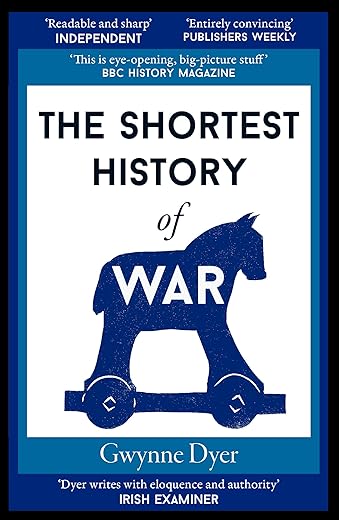The Shortest History of War: 4
£6.00£8.50 (-29%)
‘From the first armies to clashes of drones and dirty bombs, this is eye-opening, big-picture stuff’
BBC HISTORY
In this timely addition to the bestselling Shortest History series, acclaimed writer and military expert Gwynne Dyer tells the story of war from its prehistoric — perhaps pre-human — origins to the present age of algorithms, atomic weapons and rising superpower tensions.
This vivid, clear-sighted book is vital reading for anyone who wants to understand the role of war in the long human story: why we do it — and how we can stop.
BBC HISTORY
In this timely addition to the bestselling Shortest History series, acclaimed writer and military expert Gwynne Dyer tells the story of war from its prehistoric — perhaps pre-human — origins to the present age of algorithms, atomic weapons and rising superpower tensions.
This vivid, clear-sighted book is vital reading for anyone who wants to understand the role of war in the long human story: why we do it — and how we can stop.
Read more
Additional information
| Publisher | 2nd edition (8 Feb. 2022), Old Street Publishing |
|---|---|
| Language | English |
| Paperback | 256 pages |
| ISBN-10 | 1913083233 |
| ISBN-13 | 978-1913083236 |
| Dimensions | 19.8 x 2.2 x 25 cm |



by Aidan J. McQuade
In The Shortest History of War, Gwynne Dyer, quotes, of course, Clauswitz’s maxim that war is the continuation of politics by other means. He does, however, conspicuously ignore that war has often been a continuation of racism by other means.
This considerable lacuna is most apparent when Dyer traces back only as far as the American Civil War the modern conception of “total war”- the making of war on the civilian populations of belligerent nations. It is true that Grant and Sherman practiced a version of this on the Confederacy. But total war has a more ancient pedigree. The sack of Troy, for example, is a story of how it was routinely practiced in ancient times.
Both Caesar and Genghis Khan also practiced versions of total war. And, while this may have gone out of fashion for a bit amongst the white nations of Europe in the 17th and 18th Centuries, it was always the way in which “Great Powers” made war on those they regarded as inferior or subject peoples: Cromwell halved the population of Ireland in his campaign in the mid-17th century. Bonaparte’s campaign in Egypt and Palestine was ferocious in its violence towards civilians. The US campaign against Native Americans was genocidal as was the British campaign against Australian Aboriginals. The British conquest of India was another racist exemplar of total war.
But it is not Paddies and brown people that Dyer is interested in here. Rather he is interested in the “Great Power” version of politics and how this has been manifested in organised violence since ancient times. Within this narrower scope it is still a fascinating book, packed full of interesting detail and disturbing conclusions. Dyer argues that only three countries fulfil the criteria to be “Great Powers” in the 21st Century: the US, India and China. Russia he argues lacks the population to contend. So it may be unsettling to learn how it will cope with its inevitable decline. Dyer doesn’t consider the possibility that the European Union may represent an alternative political model for a 21st Century “Great Power”.
More disturbingly he notes that between them Indian and Pakistan have enough weapons to unleash a “nuclear winter” upon the Earth should they ever blunder into a nuclear exchange. In other words, in the space of a few days, while the rest of the world could be preoccupied with other things, events could unfold in South Asia that would spell the end of all human civilisation .
by Norm
Given that this one book covers the history of humans at war in fewer pages than most textbooks need to describe a single battle, this is an amazing read. It doesn’t look at the details, there are plenty of other sources for those, this uncloaks what drives us and how the weapons and methods have changed (or not changed) over time. It comes right up to Biden taking office in 2021.
by Patrick Lane
Thoroughly good read!
by G. G. Curtis
A concise history of human conflicts, and why we have always gone to war. Unfortunately we still do. Putin’s flagrant disregard for Ukraines right to exist and his unprovoked invasion has changed everything. He was not bothered by world opinion and the United Nations was and is powerless to stop his armed forces laying waste to vast swathes of the Ukraine and the killing innocent civilians. Therefore I cannot share the authors optimism. I have given it 5 stars but events subsequent to its publication have changed everything, particularly with regard the optimism expressed in the closing pages so it is in need of an update
by Dr D.
Clear, concise, uniquely enriching, the informed and informative Gwynne Dyer explores warfare from its earliest fascinating origins to todays nuclear/cyber age.
Drawing upon his masterful text ‘War’ he expands on themes of hierarchy, nationalism, terrorism, and the loss and perhaps tentative return towards our more egalitarian past.
He plots the evolution of military tactics and weaponry and the often futile sacrifice of those doing the fighting.
An easy, short read, with useful, informative, diagrams.
Highly recommended.